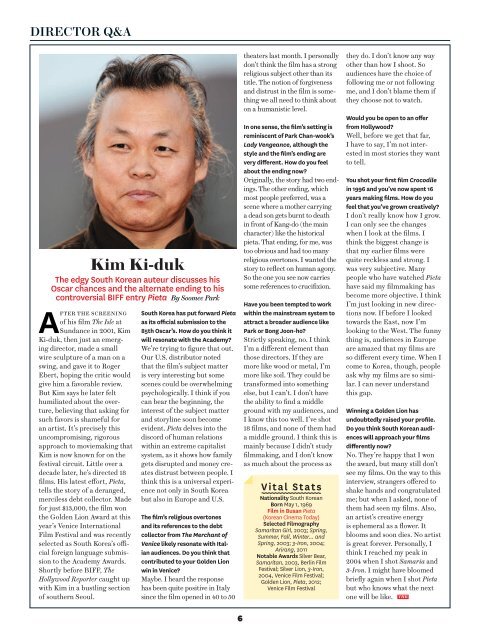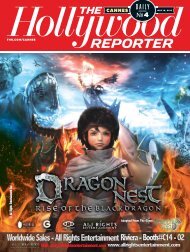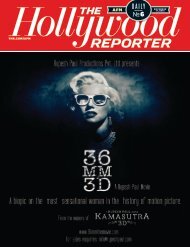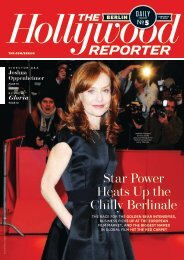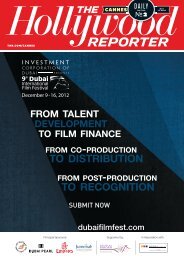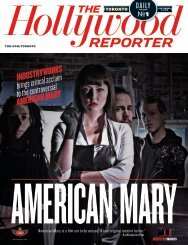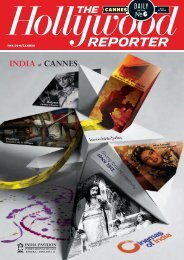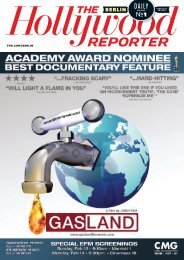Download THR's Busan Day Four Daily - The Hollywood Reporter
Download THR's Busan Day Four Daily - The Hollywood Reporter
Download THR's Busan Day Four Daily - The Hollywood Reporter
Create successful ePaper yourself
Turn your PDF publications into a flip-book with our unique Google optimized e-Paper software.
DIRECTOR Q&A<br />
Kim Ki-duk<br />
<strong>The</strong> edgy South Korean auteur discusses his<br />
Oscar chances and the alternate ending to his<br />
controversial BIFF entry Pieta By Soomee Park<br />
AFTER THE SCREENING<br />
of his film <strong>The</strong> Isle at<br />
Sundance in 2001, Kim<br />
Ki-duk, then just an emerging<br />
director, made a small<br />
wire sculpture of a man on a<br />
swing, and gave it to Roger<br />
Ebert, hoping the critic would<br />
give him a favorable review.<br />
But Kim says he later felt<br />
humiliated about the overture,<br />
believing that asking for<br />
such favors is shameful for<br />
an artist. It’s precisely this<br />
uncompromising, rigorous<br />
approach to moviemaking that<br />
Kim is now known for on the<br />
festival circuit. Little over a<br />
decade later, he’s directed 18<br />
films. His latest effort, Pieta,<br />
tells the story of a deranged,<br />
merciless debt collector. Made<br />
for just $13,000, the film won<br />
the Golden Lion Award at this<br />
year’s Venice International<br />
Film Festival and was recently<br />
selected as South Korea’s official<br />
foreign language submission<br />
to the Academy Awards.<br />
Shortly before BIFF, <strong>The</strong><br />
<strong>Hollywood</strong> <strong>Reporter</strong> caught up<br />
with Kim in a bustling section<br />
of southern Seoul.<br />
South Korea has put forward Pieta<br />
as its official submission to the<br />
85th Oscar’s. How do you think it<br />
will resonate with the Academy?<br />
We’re trying to figure that out.<br />
Our U.S. distributor noted<br />
that the film’s subject matter<br />
is very interesting but some<br />
scenes could be overwhelming<br />
psychologically. I think if you<br />
can bear the beginning, the<br />
interest of the subject matter<br />
and storyline soon become<br />
evident. Pieta delves into the<br />
discord of human relations<br />
within an extreme capitalist<br />
system, as it shows how family<br />
gets disrupted and money creates<br />
distrust between people. I<br />
think this is a universal experience<br />
not only in South Korea<br />
but also in Europe and U.S.<br />
<strong>The</strong> film’s religious overtones<br />
and its references to the debt<br />
collector from <strong>The</strong> Merchant of<br />
Venice likely resonate with Italian<br />
audiences. Do you think that<br />
contributed to your Golden Lion<br />
win in Venice?<br />
Maybe. I heard the response<br />
has been quite positive in Italy<br />
since the film opened in 40 to 50<br />
6<br />
theaters last month. I personally<br />
don’t think the film has a strong<br />
religious subject other than its<br />
title. <strong>The</strong> notion of forgiveness<br />
and distrust in the film is something<br />
we all need to think about<br />
on a humanistic level.<br />
In one sense, the film’s setting is<br />
reminiscent of Park Chan-wook’s<br />
Lady Vengeance, although the<br />
style and the film’s ending are<br />
very different. How do you feel<br />
about the ending now?<br />
Originally, the story had two endings.<br />
<strong>The</strong> other ending, which<br />
most people preferred, was a<br />
scene where a mother carrying<br />
a dead son gets burnt to death<br />
in front of Kang-do (the main<br />
character) like the historical<br />
pieta. That ending, for me, was<br />
too obvious and had too many<br />
religious overtones. I wanted the<br />
story to reflect on human agony.<br />
So the one you see now carries<br />
some references to crucifixion.<br />
Have you been tempted to work<br />
within the mainstream system to<br />
attract a broader audience like<br />
Park or Bong Joon-ho?<br />
Strictly speaking, no. I think<br />
I’m a different element than<br />
those directors. If they are<br />
more like wood or metal, I’m<br />
more like soil. <strong>The</strong>y could be<br />
transformed into something<br />
else, but I can’t. I don’t have<br />
the ability to find a middle<br />
ground with my audiences, and<br />
I know this too well. I’ve shot<br />
18 films, and none of them had<br />
a middle ground. I think this is<br />
mainly because I didn’t study<br />
filmmaking, and I don’t know<br />
as much about the process as<br />
Vital Stats<br />
Nationality South Korean<br />
Born May 1, 1969<br />
Film in <strong>Busan</strong> Pieta<br />
(Korean Cinema Today)<br />
Selected Filmography<br />
Samaritan Girl, 2003; Spring,<br />
Summer, Fall, Winter... and<br />
Spring, 2003; 3-Iron, 2004;<br />
Arirang, 2011<br />
Notable Awards Silver Bear,<br />
Samaritan, 2003, Berlin Film<br />
Festival; Silver Lion, 3-Iron,<br />
2004, Venice Film Festival;<br />
Golden Lion, Pieta, 2012;<br />
Venice Film Festival<br />
they do. I don’t know any way<br />
other than how I shoot. So<br />
audiences have the choice of<br />
following me or not following<br />
me, and I don’t blame them if<br />
they choose not to watch.<br />
Would you be open to an offer<br />
from <strong>Hollywood</strong>?<br />
Well, before we get that far,<br />
I have to say, I’m not interested<br />
in most stories they want<br />
to tell.<br />
You shot your first film Crocodile<br />
in 1996 and you’ve now spent 16<br />
years making films. How do you<br />
feel that you’ve grown creatively?<br />
I don’t really know how I grow.<br />
I can only see the changes<br />
when I look at the films. I<br />
think the biggest change is<br />
that my earlier films were<br />
quite reckless and strong. I<br />
was very subjective. Many<br />
people who have watched Pieta<br />
have said my filmmaking has<br />
become more objective. I think<br />
I’m just looking in new directions<br />
now. If before I looked<br />
towards the East, now I’m<br />
looking to the West. <strong>The</strong> funny<br />
thing is, audiences in Europe<br />
are amazed that my films are<br />
so different every time. When I<br />
come to Korea, though, people<br />
ask why my films are so similar.<br />
I can never understand<br />
this gap.<br />
Winning a Golden Lion has<br />
undoubtedly raised your profile.<br />
Do you think South Korean audiences<br />
will approach your films<br />
differently now?<br />
No. <strong>The</strong>y’re happy that I won<br />
the award, but many still don’t<br />
see my films. On the way to this<br />
interview, strangers offered to<br />
shake hands and congratulated<br />
me; but when I asked, none of<br />
them had seen my films. Also,<br />
an artist’s creative energy<br />
is ephemeral as a flower. It<br />
blooms and soon dies. No artist<br />
is great forever. Personally, I<br />
think I reached my peak in<br />
2004 when I shot Samaria and<br />
3-Iron. I might have bloomed<br />
briefly again when I shot Pieta<br />
but who knows what the next<br />
one will be like. THR


